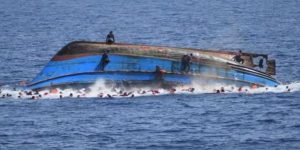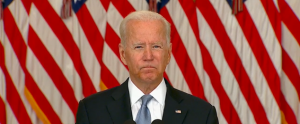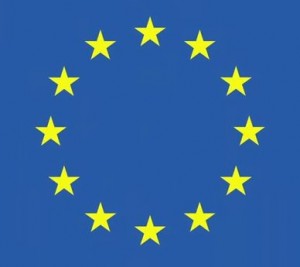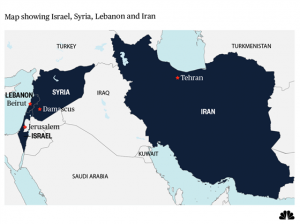
The Guardian / UK: Turkey has suspended high-level political contacts with the Netherlands and threatened to re-evaluate a key deal to halt the flow of migrants to Europe in a dramatic escalation of its diplomatic row with EU member states.
Numan Kurtulmuş, a deputy prime minister and chief government spokesman, said on Monday that the Dutch ambassador, who is on leave, would not be allowed to return in response to a ban on Turkish ministers speaking at rallies in the Netherlands.
Turkey would also close its airspace to Dutch diplomats, Kursulmuş said, adding: “There is a crisis and a very deep one. We didn’t create this crisis or bring to this stage … Those creating this crisis are responsible for fixing it.”
The spokesman’s remarks came hours after President Recep Tayyip Erdoğan defied pleas from Brussels to tone down his rhetoric, repeating accusations of European “nazism” and warning that his ministers would take their treatment by the Dutch to the European court of human rights.
Erdoğan also accused Germany’s Angela Merkel of “supporting terrorists” and criticised her for backing the Dutch in the row over Turkish campaigning abroad before an April referendum on controversial plans to expand his powers.
“Mrs Merkel, why are you hiding terrorists in your country? … Why are you not doing anything?” Erdoğan said in an interview with Turkish television. He added that the position adopted by the Dutch and a number of other EU states amounted to nazism. “We can call this neo-nazism. A new nazism tendency.”
Merkel had earlier pledged her “full support and solidarity” to the Dutch, saying allegations made twice by Erdoğan this weekend that the Dutch government was acting like Nazis were “completely unacceptable”.
The Turkish remarks followed a request on Monday by the EU’s foreign policy chief, Federica Mogherini, and enlargement commissioner, Johannes Hahn, for Ankara to “refrain from excessive statements and actions”. It was “essential to avoid further escalation and find ways to calm down the situation”, the two said in a joint statement. Jens Stoltenberg, Nato’s secretary general, urged all concerned to “show mutual respect and be calm”.
Turkey’s minister for EU affairs, Ömer Çelik, said sanctions against the Netherlands were now likely. “We will surely have sanctions against the latest actions by the Netherlands. We will answer them with these,” he said.
The Turkish justice minister, Bekir Bozdağ, said the country would “not allow anyone to play with the honour of the Turkish nation and Turkish state”, while Nurettin Canikli, a deputy prime minister, described Europe as a “very sick man”.
The threat made by Kurtulmuş to re-evaluate the deal the EU signed with Ankara in March 2016 that has successfully curbed migration from Turkey to Greece, then onward into the rest of the bloc, will be seen as particularly alarming.
Dutch police used dogs and water cannon on Sunday to disperse demonstrators after Turkey’s family minister, Fatma Betül Sayan Kaya, was escorted out of the country and the foreign minister, Mevlüt Çavuşoğlu, denied permission to land. The ministers were due to address a rally for some of the 400,000 Turks living in the Netherlands, many of whom are able to vote in the 16 April referendum.
Daan Feddo Huisinga, the Dutch chargé d’affaires in Ankara, was summoned to the foreign ministry on Monday to receive formal protests over the “disproportionate, inhumane and humiliating” treatment of the protesters and the improper reception given to the ministers.
The Netherlands, Austria, Germany, Denmark and Switzerland – all of which have large Turkish immigrant communities – have cited security and other concerns as reasons not to allow Turkish officials to campaign in their countries. But with as many as 1.4 million Turkish voters in Germany alone, Erdoğan cannot afford to ignore the foreign electorate.
The standoff has further strained relations already frayed over human rights, while repeated indications from Erdoğan that he could personally try to address rallies in EU countries risk further inflaming the situation.
The row also looks likely to dim further Turkey’s prospects of joining the EU, a process that has been under way for more than 50 years. “The formal end of accession negotiations with Turkey now looks inevitable,” the German commentator Daniel Brössler wrote in the Süddeutsche Zeitung.
Austria’s chancellor, Christian Kern, called on Monday for an EU-wide ban on Turkish rallies, saying it would take pressure off individual countries. But Merkel’s chief of staff, Peter Altmaier, said that while accession talks could be halted, he had doubts as to whether the bloc should collectively decide on a rally ban.
Analysts said the Turkish president was using the crisis to show voters that his strong leadership was needed against a Europe he routinely presents as hostile.
Erdoğan is “looking for ‘imagined’ foreign enemies to boost his nationalist base in the run-up to the referendum,” said Soner Cagaptay, the director of the Turkish Research Programme at the Washington Institute.
Marc Pierini, the EU’s former envoy to Turkey, said he saw no immediate solution to the crisis because “the referendum outcome in Turkey is very tight and the leadership will do everything to ramp up the nationalist narrative to garner more votes”.
In the medium term, Pierini said: “One can hope the fever will subside. Yet bridges have been burned at a personal level: using a ‘nazi’ narrative is extreme … and will probably prevent any summit meeting between the EU and Turkey for a while.” Erdoğan last week accused Germany of “Nazi practices” after Çavuşoğlu was banned from speaking at a rally in Hamburg.
The Turkish president twice made the same claim of the Dutch on Saturday, describing them as “Nazi remnants” and telling a rally in Istanbul: “I thought nazism was over, but I was wrong. In fact, nazism is alive in the west.”
Mark Rutte, the Dutch prime minister, who faces a strong far-right challenge in this week’s parliamentary elections and showed little desire to appease Turkey, demanded an apology for Erdoğan’s “totally unacceptable” jibe.
Denmark has also postponed a planned visit next weekend by the Turkish prime minister, Binali Yıldırım, saying the meeting could not be seen as “separate from the current Turkish attacks on Holland”.
European states are not entirely united: Çavuşoğlu himself called off a planned visit to Switzerland, despite the Swiss federal government saying there was “nothing to justify” cancelling it, after Zurich police expressed security concerns.
The French government also allowed Çavuşoğlu to address a rally in Metz on Sunday, but was strongly criticised by opposition politicians, who accused it of “flagrantly breaking with European solidarity” on the issue.




